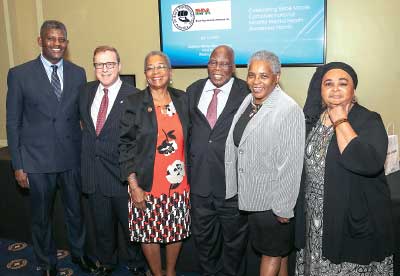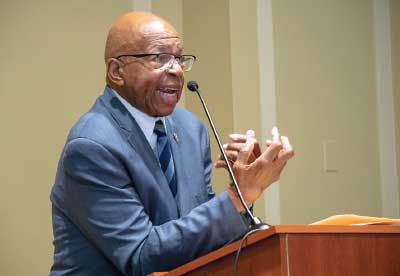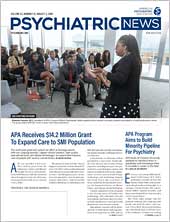Leaders of the Black Psychiatrists of America (BPA) and APA convened last month for the BPA’s annual “Mental Health Status of Black America: Capitol Hill Forum” at the Rayburn House Office Building in Washington, D.C.
A highlight of the forum was the presentation of the BPA’s 2018 James Ralph, M.D., Memorial Award for Outstanding Public Service to Donna M. Christensen, M.D., former congresswoman from the U.S. Virgin Islands. She retired from the U.S. House of Representatives in 2015 after nine terms representing the U.S. Virgin Islands. A family physician who completed her residency at Howard University Medical Center, she began her medical career in the Virgin Islands in 1975 as an emergency room physician and was later appointed commissioner of health in the Virgin Islands. While in Congress she served on the Committee on Energy and Commerce and on the Subcommittee on Health. For 16 years she chaired the Congressional Black Caucus “Health Braintrust.”
This year’s Capitol Hill Forum focused on sexual harassment. In opening remarks, Stewart noted that it was an African-American woman, New York–based activist Tarana Burke, who started using the phrase “Me Too” as early as 2006 to raise awareness about the pervasiveness of sexual abuse—more than a decade before it caught on as a viral hashtag on social media. Stewart said the growth of the Me Too movement has shown that attitudes can change.
“This is a problem we can do something about,” she said.
Nkechi Taifa, advocacy director for criminal justice at the Open Society Policy Center, a Washington, D.C.–based advocacy center, delivered a plenary address about the legacy of sexual abuse—and enforced silence about abuse—of African-American women dating back to the time of slavery.
Linda Fuller, D.O., M.P.H., a psychiatrist at Walter Reed’s National Intrepid Naval Center of Excellence for Traumatic Brain Injury, led a panel discussion about sexual harassment and abuse in the military. Joining her were Cathy Bennet-Santos, Ph.D., founder of the National Alliance of Women Veterans Inc.; Marcell Barnes, founder and CEO of Pink Hard Hats Construction; Keronica Richardson, assistant director for Women and Minority Outreach at the American Legion; and retired Lt. Col. Diane Butts.
Forum Honorary Chair Rep. Elijah Cummings (D-Md.) of Maryland’s seventh district concluded the forum with a fiery exhortation to commitment in a time of partisan division. He spoke of the importance of mental health—of being in one’s “right mind”—in order to fight for things that matter.
“I spent some time in the hospital during the last year with an infection in my knee,” he said. “Spending six months in the hospital, I thought I would lose my mind at times. … While I was in the hospital, my mother of 92 years died. I was already in physical pain, but the mental pain was very different and very difficult. There were moments when I could understand why people come to the point of saying, ‘Let God take me home.’ I thought about how blessed I have been to have an education, to have a job that pays me to do what feeds my soul.”
Referring to political battles on Capitol Hill, Cummings also said he felt blessed to still “be able to throw a punch.”
He added, “It’s one thing to talk about problems; it’s another thing to do something. How can I be the most effective and efficient where I am planted? … We are at a point where every single person who can lift us up needs to be doing so.” ■


